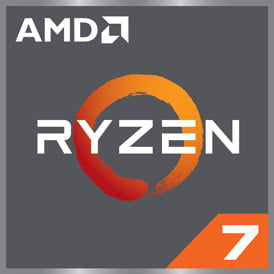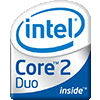
AMD Ryzen 7 2700U Benchmark, test e specifiche
Ultimo aggiornamento:
AMD Ryzen 7 2700U è stato rilasciato in Q4/2017 e ha 4 core. Il processore può elaborare 8 thread contemporaneamente e utilizza una scheda madre con il socket AM4 (PGA 1331). Nel benchmark Geekbench 5, AMD Ryzen 7 2700U ha ottenuto un risultato di 665 punti (single-core) o 2.411 punti (multi -nucleo).

| Cognome: | AMD Ryzen 7 2700U |
|---|---|
| Famiglia: | AMD Ryzen 7 (67) |
| Gruppo CPU: | AMD Ryzen 2000U (7) |
| Architettura : | Raven Ridge (Zen) |
| Segmento: | Mobile |
| Generazione: | 1 |
| Predecessore: | -- |
| Successore: | -- |
CPU Cores e frequenza di base
Il AMD Ryzen 7 2700U ha 4 core. La frequenza di clock di AMD Ryzen 7 2700U è 2,20 GHz (3,80 GHz). È possibile effettuare una valutazione iniziale delle prestazioni utilizzando il numero di core della CPU.
| CPU Cores / Threads: | 4 / 8 |
|---|---|
| Architettura principale: | normal |
| Cores: | 4x |
| Hyperthreading / SMT: | Si |
|---|---|
| Overclocking: | No |
| Frequenza: | 2,20 GHz |
| Turbo Frequenza (1 Core ): | 3,80 GHz |
| Turbo Frequenza (4 Cores): | 3,40 GHz |
Grafica interna
AMD Ryzen 7 2700U ha una grafica integrata che il sistema può utilizzare per riprodurre in modo efficiente i video, ad esempio. AMD Ryzen 7 2700U ha AMD Radeon RX Vega 10 (Raven Ridge) installato, che ha 10 multiprocessori di streaming (640 shader).
| nome GPU: | AMD Radeon RX Vega 10 (Raven Ridge) |
|---|---|
| Frequenza GPU : | 1,30 GHz |
| GPU (Turbo ): | No turbo |
| Unità di esecuzione: | 10 |
| Shader: | 640 |
| Hardware Raytracing: | No |
| Data di lancio : | Q1/2018 |
| Max. visualizzazioni: | 3 |
|---|---|
| Generation: | 8 |
| Direct X: | 12 |
| Tecnologia : | 14 nm |
| Max. GPU Memoria: | 2 GB |
| Frame Generation: | No |
Hardware codec support
I processori con grafica integrata possono elaborare più velocemente utilizzando questi codec video. Il supporto per i codec moderni può aumentare significativamente l'efficienza del sistema durante la riproduzione video.
| h265 / HEVC (8 bit): | Decodificare / Codificare |
|---|---|
| h265 / HEVC (10 bit): | Decodificare / Codificare |
| h264: | Decodificare / Codificare |
| VP8: | Decodificare / Codificare |
| VP9: | Decodificare / Codificare |
| AV1: | No |
|---|---|
| AVC: | Decodificare / Codificare |
| VC-1: | Decodificare |
| JPEG: | Decodificare / Codificare |
Memoria & PCIeAMD Ryzen 7 2700U supporta un massimo di 32 GB memoria. A seconda della scheda madre, il processore può utilizzare un massimo di 2 (Dual Channel) canali di memoria. Ciò si traduce in una larghezza di banda massima della memoria principale di 38,4 GB/s. |
|
| Tipo di memoria : | Banda di memoria: |
|---|---|
| DDR4-2400 | 38,4 GB/s |
| Max. Memoria: | 32 GB |
| Canali di memoria : | 2 (Dual Channel) |
| ECC: | Si |
| PCIe: | 3.0 x 12 |
| PCIe Larghezza di banda: | 11,8 GB/s |
Gestione termicaAMD Ryzen 7 2700U ha un TDP di 15 W. Sulla base del TDP, il produttore del sistema può e deve adattare la soluzione di raffreddamento al processore. |
|
|---|---|
| TDP (PL1 / PBP): | 15 W |
| TDP (PL2): | -- |
| TDP up: | 25 W |
| TDP down: | 12 W |
| Tjunction max.: | 95 °C |
Dettagli tecnici
La produzione moderna riduce il calore disperso di un processore e ne aumenta l'efficienza. AMD Ryzen 7 2700U è realizzato in 14 nm e ha 4,00 MB cache.
| Tecnologia : | 14 nm |
|---|---|
| Design a chip: | Chiplet |
| Presa: | AM4 (PGA 1331) |
| L2-Cache: | -- |
| L3-Cache: | 4,00 MB |
| AES-NI: | Si |
| Sistemi operativi: | Windows 10, Linux |
| Virtualizzazione: | AMD-V, SVM |
|---|---|
| Set di istruzioni (ISA): | x86-64 (64 bit) |
| Estensioni ISA: | SSE4a, SSE4.1, SSE4.2, AVX2, FMA3 |
| Data di lancio : | Q4/2017 |
| Prezzo di rilascio: | 225 $ |
| Numero di parte: | -- |
| Documenti: | Scheda tecnica |
Valuta questo processore
Risultati di benchmark

I risultati del benchmark per AMD Ryzen 7 2700U sono stati attentamente controllati da noi. Pubblichiamo solo risultati di benchmark che sono stati creati da noi o che sono stati inviati da un visitatore e poi controllati da un membro del team. Tutti i risultati sono basati e rispettano le nostre linee guida di benchmark.
Cinebench R23 (Single-Core)
Cinebench R23 è il successore di Cinebench R20 ed è anch'esso basato su Cinema 4D. Cinema 4D è un software usato a livello mondiale per creare forme in 3D. Il test single-core utilizza solo un nucleo elaborativo della CPU. A tal fine, il numero di nuclei elaborativi o la capacità di hyperthreading non sono rilevanti.

|
Intel Xeon E3-1231 v3
4C 8T @ 3,80 GHz |
||

|
Intel Core i5-7360U
2C 4T @ 3,60 GHz |
||

|
Intel Xeon E5-2699 v4
22C 44T @ 3,60 GHz |
||
|
|
AMD Ryzen 7 2700U
4C 8T @ 3,80 GHz |
||

|
AMD Ryzen 7 PRO 2700U
4C 8T @ 3,80 GHz |
||

|
Intel Processor N100
4C 4T @ 3,40 GHz |
||

|
Intel Core i7-3770
4C 8T @ 3,90 GHz |
||
Cinebench R23 (Multi-Core)
Cinebench R23 è il successore di Cinebench R20 ed è anch'esso basato su Cinema 4D. Cinema 4D è un software usato a livello mondiale per creare forme in 3D. Il test multi-core coinvolge tutti i nuclei elaborativi della CPU e si avvale del hyperthreading.

|
Intel Xeon X3470
4C 8T @ 3,20 GHz |
||

|
Intel Core i7-10510Y
4C 8T @ 2,40 GHz |
||

|
Intel Core i5-3470
4C 4T @ 3,60 GHz |
||
|
|
AMD Ryzen 7 2700U
4C 8T @ 3,40 GHz |
||

|
AMD Ryzen 7 PRO 2700U
4C 8T @ 3,40 GHz |
||

|
Intel Core i5-4570S
4C 4T @ 3,20 GHz |
||

|
Intel Core i5-2500
4C 4T @ 3,30 GHz |
||
Geekbench 5, 64bit (Single-Core)
Geekbench 5 è un benchmark multi-piattaforma che usa in modo intensivo la memoria del sistema.Il test single-core utilizza solo un nucleo elaborativo della CPU. A tal fine, il numero di nuclei elaborativi o la capacità di hyperthreading non sono rilevanti.

|
Intel Celeron N5105
4C 4T @ 2,90 GHz |
||

|
Intel Core M-5Y70
2C 4T @ 2,60 GHz |
||

|
Intel Core i5-2310
4C 4T @ 3,20 GHz |
||
|
|
AMD Ryzen 7 2700U
4C 8T @ 3,80 GHz |
||

|
Intel Pentium J6426
4C 4T @ 3,00 GHz |
||

|
Intel Celeron N6211
2C 2T @ 3,00 GHz |
||

|
Qualcomm Snapdragon 8c
8C 8T @ 2,45 GHz |
||
Geekbench 5, 64bit (Multi-Core)
Geekbench 5 è un benchmark multi-piattaforma che usa in modo intensivo la memoria del sistema.Il test multi-core coinvolge tutti i nuclei elaborativi della CPU e si avvale del hyperthreading.

|
Intel Core i3-1000G4
4C 8T @ 3,20 GHz |
||

|
Intel Pentium Gold G6505
2C 4T @ 4,20 GHz |
||

|
Intel Pentium Gold G6600
2C 4T @ 4,20 GHz |
||
|
|
AMD Ryzen 7 2700U
4C 8T @ 3,40 GHz |
||

|
AMD Ryzen 7 PRO 2700U
4C 8T @ 3,40 GHz |
||

|
Intel Core i5-3450S
4C 4T @ 2,80 GHz |
||

|
Intel Core i5-3340
4C 4T @ 3,10 GHz |
||
Geekbench 6 (Single-Core)
Geekbench 6 è un punto di riferimento per computer, notebook e smartphone moderni. Ciò che è nuovo è un utilizzo ottimizzato delle architetture CPU più recenti, ad esempio basate sul concetto big.LITTLE e combinando core CPU di diverse dimensioni. Il benchmark single-core valuta solo le prestazioni del core della CPU più veloce, il numero di core della CPU in un processore è irrilevante qui.

|
Intel Processor N50
2C 2T @ 3,40 GHz |
||

|
Intel Xeon E5-2660 v3
10C 20T @ 3,30 GHz |
||

|
Intel Xeon E5-2680 v3
12C 24T @ 3,30 GHz |
||
|
|
AMD Ryzen 7 2700U
4C 8T @ 3,80 GHz |
||

|
MediaTek Dimensity 8050
8C 8T @ 3,00 GHz |
||

|
AMD Ryzen 7 PRO 2700U
4C 8T @ 3,80 GHz |
||

|
Intel Core i5-4690T
4C 4T @ 3,50 GHz |
||
Geekbench 6 (Multi-Core)
Geekbench 6 è un punto di riferimento per computer, notebook e smartphone moderni. Ciò che è nuovo è un utilizzo ottimizzato delle architetture CPU più recenti, ad esempio basate sul concetto big.LITTLE e combinando core CPU di diverse dimensioni. Il benchmark multi-core valuta le prestazioni di tutti i core della CPU del processore. I miglioramenti del thread virtuale come AMD SMT o l'Hyper-Threading di Intel hanno un impatto positivo sul risultato del benchmark.

|
Intel Core i7-4785T
4C 8T @ 2,70 GHz |
||

|
Intel Core i5-8365UE
4C 8T @ 2,60 GHz |
||

|
Intel Core i7-10510Y
4C 8T @ 2,40 GHz |
||
|
|
AMD Ryzen 7 2700U
4C 8T @ 3,40 GHz |
||

|
AMD Ryzen 7 PRO 2700U
4C 8T @ 3,40 GHz |
||

|
Intel Core i5-7400T
4C 4T @ 2,80 GHz |
||

|
Intel Pentium Gold 7505
2C 4T @ 3,50 GHz |
||
Cinebench R20 (Single-Core)
Cinebench R20 è il successore di Cinebench R15 ed è anch'esso basato su Cinema 4D. Cinema 4D è un software usato a livello mondiale per creare forme in 3D. Il test single-core utilizza solo un nucleo elaborativo della CPU. A tal fine, il numero di nuclei elaborativi o la capacità di hyperthreading non sono rilevanti.

|
Intel Core2 Duo E6600
2C 2T @ 2,40 GHz |
||

|
AMD A4-3400
2C 2T @ 2,70 GHz |
||

|
AMD Athlon II X4 610e
4C 4T @ 2,40 GHz |
||
|
|
AMD Ryzen 7 2700U
4C 8T @ 3,80 GHz |
||

|
AMD Athlon II X4 605e
4C 4T @ 2,30 GHz |
||

|
AMD Ryzen 7 PRO 2700U
4C 8T @ 3,80 GHz |
||

|
AMD Athlon II X4 600e
4C 4T @ 2,20 GHz |
||
Cinebench R20 (Multi-Core)
Cinebench R20 è il successore di Cinebench R15 ed è anch'esso basato su Cinema 4D. Cinema 4D è un software usato a livello mondiale per creare forme in 3D. Il test multi-core coinvolge tutti i nuclei elaborativi della CPU e si avvale del hyperthreading.

|
AMD FX-8320E
8C 8T @ 3,60 GHz |
||

|
Intel Core i5-6300HQ
4C 4T @ 2,70 GHz |
||

|
Intel Core i3-1005G1
2C 4T @ 3,40 GHz |
||
|
|
AMD Ryzen 7 2700U
4C 8T @ 3,40 GHz |
||

|
AMD Ryzen 7 PRO 2700U
4C 8T @ 3,40 GHz |
||

|
Intel Core i5-4590T
4C 4T @ 2,50 GHz |
||

|
Intel Pentium Silver N6005
4C 4T @ 3,00 GHz |
||
iGPU - Prestazioni FP32 (GFLOPS a precisione singola)
Le prestazioni di calcolo teoriche dell'unità grafica interna del processore con precisione semplice (32 bit) in GFLOPS. GFLOPS indica quanti miliardi di operazioni in virgola mobile che l'iPPU può eseguire al secondo.

|
Intel Core i7-1160G7
Intel Iris Xe Graphics 96 (Tiger Lake) @ 1,10 GHz |
||

|
Intel Core i5-1155G7
Intel Iris Xe Graphics 80 (Tiger Lake) @ 1,35 GHz |
||

|
Intel Core i5-1340PE
Intel Iris Xe Graphics 80 (Alder Lake) @ 1,35 GHz |
||
|
|
AMD Ryzen 7 2700U
AMD Radeon RX Vega 10 (Raven Ridge) @ 1,30 GHz |
||

|
AMD Ryzen 5 PRO 3350G
AMD Radeon RX Vega 10 (Raven Ridge) @ 1,30 GHz |
||

|
AMD Ryzen 7 PRO 2700U
AMD Radeon RX Vega 10 (Raven Ridge) @ 1,30 GHz |
||

|
Valve Steam Deck (2023 Refresh)
AMD Custom Radeon Graphics (Steam Deck) @ 1,60 GHz |
||
Risultati stimati da PassMark CPU Mark
Alcune delle CPU elencate di seguito sono stati sottoposti a benchmarking da CPU-monkey. Tuttavia, la maggior parte delle CPU non sono state testate e i risultati sono stati stimati utilizzando una formula segreta di proprietà di CPU-monkey. Come tali, essi non riflettono con precisione i valori attuali di Passmark CPU Mark e non sono stati approvati da PAssMark Software Pty Ltd.

|
Intel Core i7-5850EQ
4C 8T @ 3,00 GHz |
||

|
AMD FX-6350
6C 6T @ 4,20 GHz |
||

|
AMD Athlon Gold Pro 3150GE
4C 4T @ 3,50 GHz |
||
|
|
AMD Ryzen 7 2700U
4C 8T @ 3,40 GHz |
||

|
AMD Ryzen 7 PRO 2700U
4C 8T @ 3,40 GHz |
||

|
Intel Xeon E5-1620 v3
4C 8T @ 3,60 GHz |
||

|
Intel Core i7-4790S
4C 8T @ 3,50 GHz |
||
Blender 2.81 (bmw27)
Blender è un software di grafica 3D gratuito per il rendering (creazione) di corpi 3D, che può anche essere strutturato e animato nel software. Il benchmark di Blender crea scene predefinite e misura i tempi richiesti per l'intera scena. Più breve è il tempo richiesto, meglio è. La scena di riferimento, abbiamo selezionato bmw27.

|
Intel Core i7-1065G7
4C 8T @ 3,50 GHz |
||

|
AMD Ryzen 5 3500U
4C 8T @ 3,00 GHz |
||

|
AMD Ryzen 5 PRO 3500U
4C 8T @ 3,00 GHz |
||
|
|
AMD Ryzen 7 2700U
4C 8T @ 3,40 GHz |
||

|
Intel Core i5-4670K
4C 4T @ 3,60 GHz |
||

|
Intel Core i7-3770K
4C 8T @ 3,90 GHz |
||

|
Intel Core i7-3770
4C 8T @ 3,90 GHz |
||
CPU-Z Benchmark 17 (Multi-Core)
Il benchmark CPU-Z misura le prestazioni di un processore misurando il tempo impiegato dal sistema per completare tutti i calcoli del benchmark. Più velocemente viene completato il benchmark, maggiore è il punteggio.

|
Intel Core i7-4720HQ
4C 8T @ 2,60 GHz |
||

|
AMD FX-8350
8C 8T @ 4,00 GHz |
||

|
Intel Core i5-4670
4C 4T @ 3,40 GHz |
||
|
|
AMD Ryzen 7 2700U
4C 8T @ 2,20 GHz |
||

|
AMD FX-9370
8C 8T @ 4,40 GHz |
||

|
Intel Core i7-3610QM
4C 8T @ 2,30 GHz |
||

|
Intel Core i7-4710HQ
4C 8T @ 2,50 GHz |
||
Cinebench R15 (Single-Core)
Cinebench R15 è il successore di Cinebench 11.5 ed è anch'esso basato su Cinema 4D. Cinema 4D è un software usato a livello mondiale per creare forme in 3D. Il test single-core utilizza solo un nucleo elaborativo della CPU. A tal fine, il numero di nuclei elaborativi o la capacità di hyperthreading non sono rilevanti.

|
Intel Core i7-4850HQ
4C 8T @ 3,50 GHz |
||

|
Intel Core i7-4930K
6C 12T @ 3,90 GHz |
||

|
Intel Core i7-5820K
6C 12T @ 3,60 GHz |
||
|
|
AMD Ryzen 7 2700U
4C 8T @ 3,80 GHz |
||

|
AMD Ryzen 3 3250U
2C 4T @ 3,50 GHz |
||

|
AMD Athlon PRO 300U
2C 4T @ 3,30 GHz |
||

|
AMD Ryzen 7 PRO 2700U
4C 8T @ 3,80 GHz |
||
Cinebench R15 (Multi-Core)
Cinebench R15 è il successore di Cinebench 11.5 ed è anch'esso basato su Cinema 4D. Cinema 4D è un software usato a livello mondiale per creare forme in 3D. Il test multi-core coinvolge tutti i nuclei elaborativi della CPU e si avvale del hyperthreading.

|
AMD FX-8350
8C 8T @ 4,10 GHz |
||

|
Intel Core i5-1035G7
4C 8T @ 3,30 GHz |
||

|
Intel Core i7-6700T
4C 8T @ 3,00 GHz |
||
|
|
AMD Ryzen 7 2700U
4C 8T @ 3,40 GHz |
||

|
AMD Ryzen 7 PRO 2700U
4C 8T @ 3,40 GHz |
||

|
Intel Xeon E-2224G
4C 4T @ 4,30 GHz |
||

|
Intel Core i3-9100F
4C 4T @ 3,80 GHz |
||
Benchmarks

Cinebench R23 (SC)
586 inserimenti
586 inserimenti

Cinebench R23 (MC)
565 inserimenti
565 inserimenti

Geekbench 5 (SC)
2.488 inserimenti
2.488 inserimenti

Geekbench 5 (MC)
2.461 inserimenti
2.461 inserimenti

Geekbench 6 (SC)
1.755 inserimenti
1.755 inserimenti

Geekbench 6 (MC)
1.703 inserimenti
1.703 inserimenti

Cinebench R20 (SC)
656 inserimenti
656 inserimenti

Cinebench R20 (MC)
604 inserimenti
604 inserimenti

FP32 SP (iGPU)
2.039 inserimenti
2.039 inserimenti

PassMark CPU-Mark
2.392 inserimenti
2.392 inserimenti

Blender 2.81 (bmw27)
190 inserimenti
190 inserimenti

CPU-Z Benchmark 17 (MC)
733 inserimenti
733 inserimenti

Cinebench R15 (SC)
1.106 inserimenti
1.106 inserimenti

Cinebench R15 (MC)
1.101 inserimenti
1.101 inserimenti

Geekbench 3 (SC)
942 inserimenti
942 inserimenti

Geekbench 3 (MC)
938 inserimenti
938 inserimenti

Cinebench R11.5 (SC)
825 inserimenti
825 inserimenti

Cinebench R11.5 (MC)
836 inserimenti
836 inserimenti
Confronti più popolari
Torna all'indice





